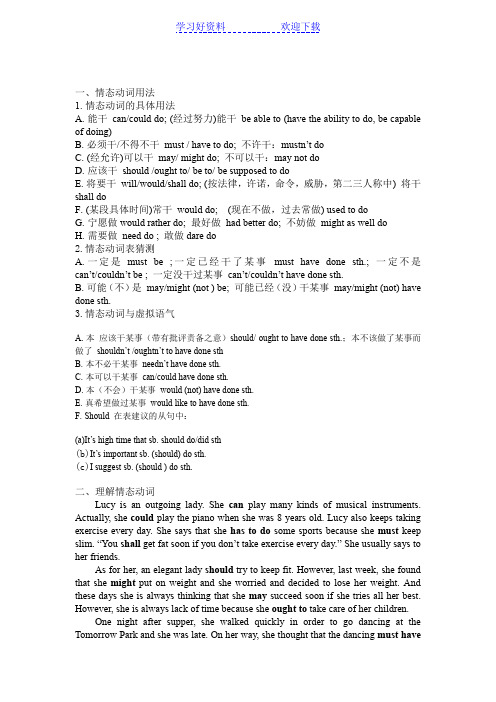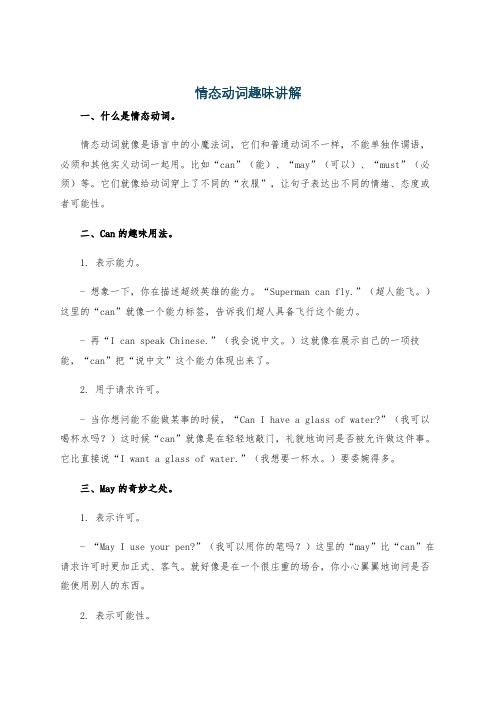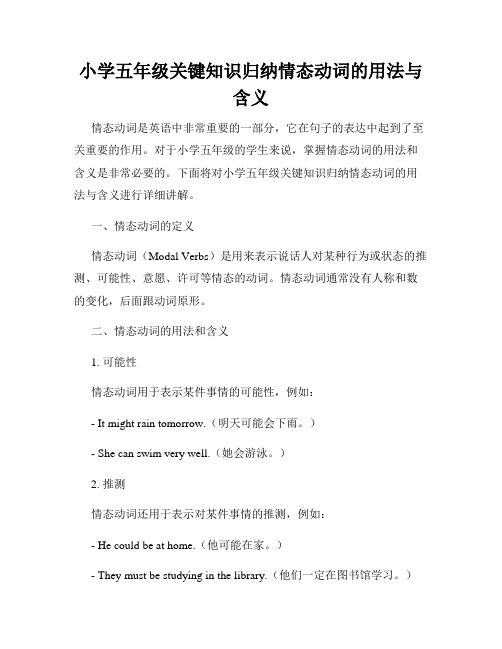情态动词讲解归纳
情态动词(基础讲解)

情态动词的用法【用法讲解】考试要求:中考要求掌握情态动词在一般疑问句的问与答,理解情态动词表示猜测的用法及情态动词的被动语态应用.情态动词表示说话人对某一动作或状态的态度,认为“可能”,“应该”或“必要”等。
情态动词本身词义不完全,不能独立作谓语动词,必须和动词原形连用(ought除外)。
情态动词没有人称和单复数的变化。
常用情态动词有can(could),may(might),must, ought to,have to,need, dare, shall(should),will(would)。
1. 情态动词can 和could的主要用法(1)表示能力,意为“能,会”。
Can you swim? 你能游泳吗?His granny is over eighty but still can read without glasses。
他的奶奶虽然八十多岁了,但是仍旧不用戴眼镜能够阅读。
注意:can和be able to表示“能力”时的区别:can只有现在式和过去式两种形式,而be able to除了现在式和过去式,还有将来式和完成式等多种形式.She will be able to help you tomorrow afternoon。
明天下午她将能帮助你.This is the information that I have been able to get so far.这是我到目前为止能得到的信息。
(2)表示“许可,允许"。
can 和could没有时态上的区别,could比can在语气上更客气;在回答could引导的一般疑问句时要用can。
Could/Can you tell me the way to the railway station?你能告诉我去火车站的路吗?—Could I use your pen?我可以用你的钢笔吗?—Yes,of course you can。
是,当然你可以。
情态动词详细讲解

情态动词情态动词表示说话人对动作或状态的各种观点和态度,如需要、猜测、意愿或怀疑等。
情态动词有词义,但不完全,是所谓的“辅助性”动词,在句中不能单独充当谓语。
一、情态动词的特征和形式A.情态动词的各种形式如下:情态动词may、might 、can、could、must、have to、ought to、will/ would、shall/should、need、dare、used to否定式may not、might not、can not 、could not、must not、do not have to、ought not to、will not、would not、shall not、should not、need not、dare not、used not to、did not use to简略否定式mayn't(老式英语,现在不常见)、mightn't、can't、couldn't、mustn't、don't have to、oughtn't to(否定句中to可省略)、won't、wouldn't、shan't(只用于英国英语)shouldn't、needn't、daren't、usedn't to、didn't use toB.情态动词除ought to, used to等外,后面只接不带to的不定式。
1.情态动词+doYou shouldn't be so careless.你不该这样粗心大意。
Jessica told him yesterday she might not go on the trip.杰西卡昨天告诉他,她可能不去旅行了。
Difficulties can and must be overcome.困难能够而且必须克服。
2.情态动词+be doingShe must be listening to pop music.她肯定在听流行音乐。
情态动词讲解

--- Yes, you may. /Yes, please. (No, you mustn’t.) ’
2. 表示可能性。 意为“或许,可能” 常用于肯定句或否 表示可能性。 意为“或许,可能” 定句中。 可能性小。 定句中。might 比 may 可能性小。 1) They may/might be in the library now. 2) She may not know the truth. (或许不,可能不) 或许不,可能不 或许不 3) She may/might have gone home.
5. — Could I borrow your dictionary? C — Yes, of course you _______. A. might B. will C. can D. should
6. — Might I watch TV after supper? A — Yes, you ________. A. may B. must C. might D. could
3. 表示成功地做了某事时,只能 表示成功地做了某事时,只能was/were able to, 不 , 能用could。 能用 。
was able to He ________ flee Europe before the war broke out.
may 与might
1. 表示“许可”或“请求”,有“可以”的意思,比can 表示“许可” 请求” 可以”的意思, 正式。 正式。 表示委婉语气。 口语中常用 might 代 may ,表示委婉语气。 表示委婉语气 否定回答时常用“ 否定回答时常用“must not”表“禁止,阻止”。 表 禁止,阻止” 1) --- May/Might I watch TV after supper?
高中英语情态动词讲解

一、情态动词用法1.情态动词的具体用法A.能干can/could do; (经过努力)能干be able to (have the ability to do, be capable of doing)B.必须干/不得不干must / have to do; 不许干:mustn’t doC.(经允许)可以干may/ might do; 不可以干:may not doD.应该干should /ought to/ be to/ be supposed to doE.将要干will/would/shall do; (按法律,许诺,命令,威胁,第二三人称中) 将干shall doF.(某段具体时间)常干would do; (现在不做,过去常做) used to doG.宁愿做would rather do; 最好做had better do; 不妨做might as well doH.需要做need do ; 敢做dare do2.情态动词表猜测A.一定是must be ;一定已经干了某事must have done sth.; 一定不是can’t/couldn’t be ; 一定没干过某事can’t/couldn’t have done sth.B.可能(不)是may/might (not ) be; 可能已经(没)干某事may/might (not) have done sth.3.情态动词与虚拟语气A.本应该干某事(带有批评责备之意)should/ ought to have done sth.;本不该做了某事而做了shouldn’t /oughtn’t to have done sthB.本不必干某事needn’t have done sth.C.本可以干某事can/could have done sth.D.本(不会)干某事would (not) have done sth.E.真希望做过某事would like to have done sth.F.Should 在表建议的从句中:(a)It’s high time that sb. should do/did sth(b)It’s important sb. (should) do sth.(c)I suggest sb. (should ) do sth.二、理解情态动词Lucy is an outgoing lady. She can play many kinds of musical instruments. Actually, she could play the piano when she was 8 years old. Lucy also keeps taking exercise every day. She says that she has to do some sports because she must keep slim. “You shall get fat soon if you don’t take exercise every day.” She usually says to her friends.As for her, an elegant lady should try to keep fit. However, last week, she found that she might put on weight and she worried and decided to lose her weight. And these days she is always thinking that she may succeed soon if she tries all her best. However, she is always lack of time because she ought to take care of her children.One night after supper, she walked quickly in order to go dancing at the Tomorrow Park and she was late. On her way, she thought that the dancing must havebegun, and the coach could have taught or shown many new moves. She was afraid that her friends might have left before she got there. She was regretful then. She should have had supper earlier, or she could have taken a taxi, and indeed she needn’t have taken a bath in advance. When she reached the park finally, she found nobody was there. She remembered suddenly that it had been reported on the radio that there would be a heavy rain that night.思考每个加黑的情态动词的含义;什么时候用情态动词的完成式,分别表达什么意思。
情态动词趣味讲解

情态动词趣味讲解一、什么是情态动词。
情态动词就像是语言中的小魔法词,它们和普通动词不一样,不能单独作谓语,必须和其他实义动词一起用。
比如“can”(能)、“may”(可以)、“must”(必须)等。
它们就像给动词穿上了不同的“衣服”,让句子表达出不同的情绪、态度或者可能性。
二、Can的趣味用法。
1. 表示能力。
- 想象一下,你在描述超级英雄的能力。
“Superman can fly.”(超人能飞。
)这里的“can”就像一个能力标签,告诉我们超人具备飞行这个能力。
- 再“I can speak Chinese.”(我会说中文。
)这就像在展示自己的一项技能,“can”把“说中文”这个能力体现出来了。
2. 用于请求许可。
- 当你想问能不能做某事的时候,“Can I have a glass of water?”(我可以喝杯水吗?)这时候“can”就像是在轻轻地敲门,礼貌地询问是否被允许做这件事。
它比直接说“I want a glass of water.”(我想要一杯水。
)要委婉得多。
三、May的奇妙之处。
1. 表示许可。
- “May I use your pen?”(我可以用你的笔吗?)这里的“may”比“can”在请求许可时更加正式、客气。
就好像是在一个很庄重的场合,你小心翼翼地询问是否能使用别人的东西。
2. 表示可能性。
- “It may rain tomorrow.”(明天可能会下雨。
)“may”在这里就像一个小预言家,给我们一种不太确定的感觉,只是说有下雨的可能性,不是肯定会下雨。
四、Must的强硬角色。
1. 表示必要性或义务。
- “You must wear a seatbelt in the car.”(你必须在汽车里系安全带。
)“must”就像一个严厉的小警察,规定了你一定要做这件事,没有商量的余地。
2. 表示推测(用于肯定句中)- “He must be at home because his car is in the driveway.”(他一定在家,因为他的车在车道上。
初中英语情态动词的讲解

初中英语情态动词的讲解情态动词是英语中的一类特殊动词,用于表示说话人的态度、推测、能力、许可等。
初中阶段研究英语时,情态动词是一个重要的语法知识点。
本文将对初中英语中常用的情态动词进行讲解。
1. CanCan 是一个情态动词,用于询问和表示能力、可能性、允许等。
是一个情态动词,用于询问和表示能力、可能性、允许等。
1.1 用法- 用于询问能力:Can 用于询问某人是否有能力做某事。
Can用于询问某人是否有能力做某事。
- Can you swim?(你会游泳吗?)- 用于表示可能性:Can 用于表示某事有可能发生。
Can用于表示某事有可能发生。
- It can rain tomorrow.(明天可能会下雨。
)- 用于征求允许:Can 用于请求允许做某事。
Can用于请求允许做某事。
- Can I borrow your pen?(我可以借用你的钢笔吗?)1.2 注意事项- 当 Can 用于疑问句时,其后的动词需用原形。
Can用于疑问句时,其后的动词需用原形。
- Can she play the guitar?(她会弹吉他吗?)2. MustMust 是一个情态动词,用于表示必须,义务和推测。
是一个情态动词,用于表示必须,义务和推测。
2.1 用法- 用于表示必须:Must 用于表示某事是必须的。
Must用于表示某事是必须的。
- You must finish your homework before watching TV.(你必须在看电视之前完成作业。
)- 用于表示义务:Must 用于表示某事是责任所在。
Must用于表示某事是责任所在。
- We must obey the rules.(我们必须遵守规则。
)- 用于表示推测:Must 用于表示一种较为确信的推测。
Must用于表示一种较为确信的推测。
- He must be tired after running for so long.(他跑了这么长时间,一定很累了。
英语情态动词讲解

可能性的强弱层次
must >should/ought to >can/could > may/might
should/ought to表示推测
根据经验的推测,“应当、应该” e.g. Your photos should be ready by12:00.
could表过去的能力 At that time we thought the story could not be true.
You cannot smoke in the meeting room. (此句的cannot 表示“禁止”)
情态动词can/could
01
can/could 与be able to 相比
may用于表示,应该(多用于法律条文)
03
e.g. He may be a teacher.
may/might表示可能性
02
e.g. May I use your bike?
may表示请求别人允许
01
情态动词may/might
情态动词shall/should
用于第一、三人称,征求对方意见 e.g. Shall we go now? What should we do next ? (用should 比 shall 表示更客气) shall 用于法律、规定,表示义务和规定 g. The sign reads:No person shall smoke here! should表示应该 e.g. You should not judge a man by his clothes.
Modal Verbs
PLEASE ENTER YOUR TITLE HERE
小学五年级关键知识归纳情态动词的用法与含义

小学五年级关键知识归纳情态动词的用法与含义情态动词是英语中非常重要的一部分,它在句子的表达中起到了至关重要的作用。
对于小学五年级的学生来说,掌握情态动词的用法和含义是非常必要的。
下面将对小学五年级关键知识归纳情态动词的用法与含义进行详细讲解。
一、情态动词的定义情态动词(Modal Verbs)是用来表示说话人对某种行为或状态的推测、可能性、意愿、许可等情态的动词。
情态动词通常没有人称和数的变化,后面跟动词原形。
二、情态动词的用法和含义1. 可能性情态动词用于表示某件事情的可能性,例如:- It might rain tomorrow.(明天可能会下雨。
)- She can swim very well.(她会游泳。
)2. 推测情态动词还用于表示对某件事情的推测,例如:- He could be at home.(他可能在家。
)- They must be studying in the library.(他们一定在图书馆学习。
)3. 动作的能力、习惯情态动词也可以表示一个人的能力或者习惯,例如:- I can play the piano.(我会弹钢琴。
)- She could run very fast when she was young.(她年轻时跑得很快。
)4. 请求、建议和命令情态动词还可以用来表示请求、建议和命令等情态,例如:- Can you pass me the salt, please?(请你把盐递给我好吗?)- You should finish your homework before watching TV.(看电视之前你应该完成作业。
)5. 允许和禁止情态动词还可以表示允许和禁止的意思,例如:- May I go to the bathroom?(我可以去洗手间吗?)- You must not smoke here.(你不可以在这里吸烟。
)6. 必要性和可能性情态动词还可以表示某件事情的必要性和可能性,例如:- You should study hard to get good grades.(你应该努力学习以获取好成绩。
- 1、下载文档前请自行甄别文档内容的完整性,平台不提供额外的编辑、内容补充、找答案等附加服务。
- 2、"仅部分预览"的文档,不可在线预览部分如存在完整性等问题,可反馈申请退款(可完整预览的文档不适用该条件!)。
- 3、如文档侵犯您的权益,请联系客服反馈,我们会尽快为您处理(人工客服工作时间:9:00-18:30)。
情态动词讲解归纳 Revised final draft November 26, 2020链接中考语法:情态动词一、情态动词的特点:情态动词,又叫情态助动词。
它们具有以下特点:⑴它们必须与其他动词连用,即:情态动词+动词原形,表示说话人对所述动作的看法,如需要、可能、意愿或怀疑等。
⑵绝大多数情态动词没有人称和数的变化,即第三人称单数不加-s(以be和have开头的情态动词短语除外)。
⑶在意义上,情态动词具有“多义性”。
例如:can既可表示能力,又可表示可能、允许等意义。
二、部分情态动词的基本用法:1.can的基本用法:⑴表示体力或智力上的能力,即“能够,会”,可与beableto转换。
例如:HecanspeakEnglish./HeisabletospeakEnglish.他会讲英语。
Canyouplaybasketball—No,I can’t.你会打篮球吗——我不会。
如果表示将来具备的能力,要用willbeableto。
例如:IfIhaveagoodsleep,Iwillbeabletodotheproblem.假如我睡个好觉,我就能做那道题目了。
⑵表示许可,主要用于口语,书面语一般用may。
例如:Canwegohomenow,please—No,you can’t.我们可以现在就回家吗——不可以。
Youcanonlysmokeinthisroom.你只能在这间房间里抽烟。
You can’t keepthelibrarybooksformorethanamonth.图书馆的书借期不可超过一个月。
⑶表示“可能”,与may同义,但一般用在疑问句中。
例如:Whatcanhepossiblywant他可能会想要什么呢另外,在否定句中,否定形式can’t表示推测“不大可能”。
例如:Anybodycanmakemistakes.任何人都可能会犯错误。
Thenews can’t betrue.那消息不大可能是真的。
与第一、二人称连用时,还可以就可能的解决问题的方式或可能的行为提出建议。
在这里,也可用could使语气婉转。
例如:Can/Couldwemeetagainnextweek下周我们可以再见面吗Whatshallwedo—Wecan/couldtryaskingLucyforhelp.我们怎么办呢——我们可以请露茜帮忙试试看。
Youcan/couldhelpmewiththecooking.你可以帮我做饭。
2.may的基本用法:⑴表示“许可”,用can比较口语化。
例如:Youmay/cancomeifyouwish.如果你想来,你就来。
Youmaynotpickflowersinthispark.本公园内不许摘花。
(maynot表示按规定不许可,如果用mustn’t则表示说话人不许可。
)MayIs mokehereNo,youmustn’t.我可以在这里抽烟吗不行。
(mustn’t表示明确的禁止。
)⑵肯定句中表示推测,“可能”。
例如:Itmayraintomorrow.明天可能会下雨。
Thenewsmaynotbetrue.这个消息可能不会是真的。
注意:如果在疑问句中表示“可能”,通常用can。
例如:Canitbetrue那会是真的吗Whocanhebe他究竟是谁呢⑶注意:May I/we……Yes,youmay.No,youmustn’t.3.must的基本用法:⑴表示必须,强调说话人的主观意志。
例如:Imust gonow,orI’llbelate.我必须现在就走,否则就迟到了。
Youmust beherebyteno’clock.你一定要在10点钟前到这里。
注意:表示“必须“时,must的否定式为needn’t,或don’thaveto,而不是mustn’t。
也就是:Must I/we……Yes,youmust.No,you needn’t/don’thaveto.例如:MustIgowiththem?No,you needn’t.我必须跟他们走吗不必。
⑵表示推测,一般只用于肯定陈述句,表示非常肯定。
例如:Shedidn’tlookatme.She mustbeangry.她不朝我看,一定是生气了。
HeisgoodatEnglish.Hemustknowtheword.他英语好,准知道这个词。
YoumustbeMr.Jones.想必您就是琼斯先生吧。
4.haveto的基本用法:haveto可视为情态动词,但它与其他情态动词在用法上稍有不同。
其他情态动词没有人称和数的变化,而haveto却要视主语的不同而变化。
例如:I/You/We/Theyh aveto….He/She/Ithasto….Youdon’thaveto….Doesshehavet o…haveto又作havegotto,意思是“必须,不得不”。
和must不同,must强调主观需要;haveto强调客观需要。
例如:Sorry,Ihavetoleavenow.对不起,现在我得走了。
I’vegotto gotoameeting.我得去参加一个会议。
Willhehavetoworkdeepintothenight他将不得不工作到深夜吗You don’thaveto knock–justwalkin.你不必敲门,直接进来就行。
(don’thaveto=needn’t)1)情态动词must及其否定形式mustnotmust译为“必须做------”其否定意义“不必做-------”,用don`thaveto表示,而不用mustnot。
如:——mustIfinishittonight?——No,youdon`thaveto.而mustnot译作“禁止做--------”。
如:Youmustnotthrowlitterabout.Don`tthrowlitterabout.别到处乱扔垃圾。
2)情态动词maymay有两种含义,表示请求允许,译作“可以”。
如:MayIcomein我可以进来吗表示推测,译作“可能”。
如:Youmaygetaheadachewhenyouworktoohard.当你工作太累时你可能回感到头疼。
Youmaygetaheadachewhenyoucan`tgetenoughsleep.当你睡眠不足时,你可能会头疼。
一、典型例题:【2014连云港】—Iknowbywhattimeyouwanttheprojecttobedone?—Bythedayaftertomorrow.youfinishitontime?A.May;CanB.Must;NeedC.Could;MustD.Need;Would【2014长沙】—Who’ssinginginthegarden?—ItbeMr.Brown.Healwayspracticessingingatthistime.A.mustB.can’tC.need 【2014河北】I______followyou.Wouldyoupleaserepeatit?A.can’tB.mustn’tC.needn’tD.shouldn’t【2014北京】—MustIhandinmyhomeworknow,Mr.Smith?—No,you_______. A.can’t B.shouldn’t C.wouldn’tD.needn’t【2014扬州】—Excuseme,mayIkeepthebookalittlelonger?—Sorry.You________returnittoday.二、课堂练习:()1.—Hello!MayIspeaktoMary?—_______A.I’mMary.B.Maryisme.C.ThisisMaryspeaking.D.I’mspeaking.()2.Mymotheraskedyou_______whenyoucomeback.A.ringupherB.ringherupC.toringupherD.toringherup()3.Youshould_______whenyourparentsaren’tathome.A.lookyourselfafterB.takecareforyourselfC.takecareyourselfD.takecareofyourself()4.—MayIaskyousomequestions,Dr.Wang?—_______A.You’rewelcome.B.Sure,goahead.C.No,I’mbusy.D.Yes,youmust.()5.—MustItakepartintheactivity?—No,you_______.You’retooyoung.Youshouldlookafteryourself.A.mustn’tB.don’tC.can’tD.don’thaveto()6.—Whotaught_______Japanese?—Ilearneditby_______.A.you;myselfB.your;myselfC.yourself;meD.yourself;myself()7.Longlong’sfatherisabusinessman.Heisverybusy,soLonglongonlytalks_ ______him_______thephone.A.to;inB.with;byC.with;onD.to;by ()8.—_______tokeepourclassroomcleanandtidy.—Youareright.A.That’sourdutyB.ThisisourdutyC.It’sourdutyD.Thedutyis()9.—MayIwatchTV,Mom?—I’mafraidyou_______.A.shouldnotB.can’tC.mustnotD.maynot ()10.Shewasafraidof_______SARSbecauseitwasdangerous.A.catchB.catchesC.caughtD.catching。
